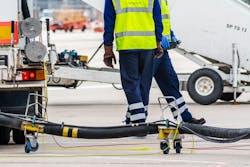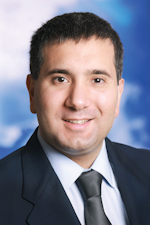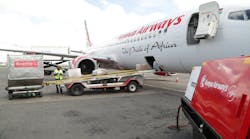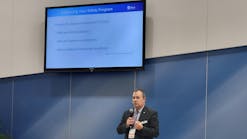Ever since the IATA Safety Audit for Ground Operations (ISAGO) program was launched in 2008, the number of audits performed – as well as the number of stations in the ISAGO registry – has grown steadily.
As of Dec. 31, 2016 the number of registered Ground Service Providers (GSPs) in the ISAGO Registry surpassed 200, with almost 430 registered stations in over 270 airports worldwide. ISAGO auditors have performed more than 1,300 audits since the program’s inception.
However, the number of ISAGO pool members, who provide the auditors, has not increased at the same rate to meet the demand for audits, according to an information paper on the new ISAGO operational model published by IATA.
“It is generally accepted that the existing model has not been as successful as the industry would have liked. Whilst there has been growth in demand for ISAGO registration/accreditation since inception, this has not been as widespread or as rapid as expected,” says Jon Conway, Director General of the Airport Services Association (ASA). “There are several reasons, including a lack of commensurate growth in audit pool membership and a lack of recognition, from many regulatory authorities, of ISAGO as an acceptable alternative to an individual airline’s ground operations oversight requirements. There were also some issues with consistency and quality.”
A New Audit Model
IATA has therefore initiated a project to undertake a complete review of ISAGO since, after seven years of operation, the industry recognized that the audit program could be improved in such a way that all stakeholders received benefits.
A new operational audit model was devised by IATA to introduce improvements in the management of the ISAGO audit program, which will continue to be performed by IATA but with a much larger remit, the information paper notes.
“The main changes include a move away from the airline populated pool system,” notes ASA’s Conway. “IATA will establish a ‘Charter of Professional Auditors’ (CoPA). Auditors from this group, trained by IATA, will conduct audits under a lead auditor. In addition, the management of the program will be via an ISAGO Agent. They will be contracted to IATA to administer the program.
“It is proposed the costs associated with the new model will be passed on fully to the ground service providers and there will be a greater focus on GSPs’ management system, especially the safety management system (SMS).”
A New Role for ISAGO Agents
Under the new ISAGO model, “IATA will have greater involvement and oversight of the recruitment, training and qualification of the auditors to be used for ISAGO audits. This would be achieved by establishing the ‘IATA Charter of Professional Auditors’ (CoPA), membership of which is necessary to participate in an ISAGO audit. Application for membership of the CoPA will be open to any person that has the prerequisite skillset,” the information paper highlights.
“Once accepted by IATA, the candidate auditor will undergo three stages of training and assessment, including newly-developed computer-based training of ground operations management and discipline-specific operations, program-focused training and onsite audit evaluation. Additional training will be provided for qualification as a Lead Auditor. Recurrent training, to keep abreast of developments will also be provided on an annual basis. Criteria are specified for auditors’ currency and performance measurement.”
The new plan foresees audits to be performed no longer through the airline audit pool of ISAGO, but rather through ISAGO agents.
“IATA will allocate audits on an annual basis to ISAGO Agents (GOAs). GOAs will be contracted by IATA to administer all aspects of the audits on its behalf. The GOA will be responsible for organizing the audit schedule and plan for the allocated audits, the establishment of the audit teams (including the assignment of the Lead Auditors), liaising with the GSP and ensuring delivery of the final audit report to IATA. The GOAs would be required to select their auditors only from the CoPA, ensuring that auditor resource usage is maximized,” the information paper says.
“The Lead Auditor will play a more prominent role in managing both onsite and offsite activities, including audit activity planning, assisting the GSP in the closing of findings, closure of the audit and production of a quality-controlled audit report. IATA will implement an oversight program to monitor and check the quality of the audits and the performance of the auditors, particularly the Lead Auditor.
“IATA will implement a scheme of charges to apportion fees on a program cost-recovery basis. Audit fees, payable by the GSP, would be based on auditor professional fees (man-day rates) as determined by the audit type and scope (disciplines covered), and administration charges (GOA/IATA). Airlines would contribute to the program maintenance and development by annual subscription for access to audit reports or individual purchases.”
A Widened Scope
“IATA will expand the scope of the ISAGO audits to cover additional ground operations, e.g., catering operations in the vicinity of the aircraft, and safety-related activities. IATA will continue to develop the ISAGO reference documentation, the ISAGO Standards Manual (GOSM), Aircraft Handling Manual (AHM), IATA Ground Operations Manual (IGOM) and other publications,” the information paper explains.
“The aim is to cover as many ground operations as practicable, and to establish global harmonization and standardization of the standards and procedures. The development or revision of operational procedures, such as in the IGOM, will in some cases incorporate an objective-based approach that would allow the implementation of an acceptable means of compliance.”
Safety Management Systems
The new operational audit model of ISAGO raises the importance of management systems, including SMS, within a GSP’s organization.
“The ISAGO Registration is focused on the Headquarter Audit and the level of conformity with the management and organization (ORM) GOSARPs, and the ability of the organization to manage the ground operations at its stations. The Station Audit becomes a verification of the implementation of processes and procedures, including the adoption of local or customer-oriented requirements, which are managed or overseen at the corporate level,” the information paper explains.
“In March 2016 IATA established a strategy for a gradual implementation of Safety Management System (SMS) requirements for ISAGO registered Providers, to elevate all the ISAGO SMS provisions currently in Edition 5 of the GOSM from Recommended Practices to Standards by 2019. The SMS strategy is primarily intended to allow Providers to establish implementation plans (and to budget for resources accordingly) to raise their level of safety investment and commitment to equal that required of their customer airlines.”
A Look Ahead
The transition to the new model has been underway for approximately two years, and the new model will be fully operational in early 2018 when the first batch of audits will be performed in accordance with the new model.
The aircraft ground handling industry has been supportive of ISAGO since its inception, and it also supports the new operational model.
“The GSP community has always been supportive of a standardized audit program/methodology, and we remain so. There is a level of disappointment in that ISAGO – and indeed IGOM – has not been as successful as envisaged and there remains concern that the number of ‘redundant’ airline audits will not decrease. We (ASA) are keen to work with IATA and others, to convince the regulators that ISAGO is a high quality program and should replace the need for redundant ground operations compliance audits,” says Conway.
“The uptake of ISAGO has been reasonable if not spectacular,” he continues. “IATA has set up a working group (including airlines and GSPs) to help advance the ISAGO – and IGOM – cause, and ASA is part of this group. The benefits of an industry standard audit program would seem to be self-evident, so the next couple of years, with the new model in place, will determine ISAGO’ success.
“It was interesting and a little unfortunate to hear a major U.S. carrier recently and openly stating they would not select an ISAGO accredited GSP over a non ISGAO GSP at a station they were tendering for ground handling. Clearly there are commercial and other implications to any tender, but we are told an ISAGO registration should provide the holder with a competitive advantage. The evidence on this is less compelling.”
IATA believes that, overall, a more efficient and effective ISAGO will result in better benefits all around.
“The realization of the benefits will be greatly enhanced by all stakeholders playing their part. IATA will therefore actively pursue its member airlines to commit to the program by including ISAGO as a contractual requirement for their ground operations,” the information paper explains. “IATA will also pursue Airport Authorities to benefit from the ISAGO program, ensuring duplicate effort is eliminated, and IATA will seek appropriate regulatory recognition of ISAGO by States and other regulatory organizations.”









